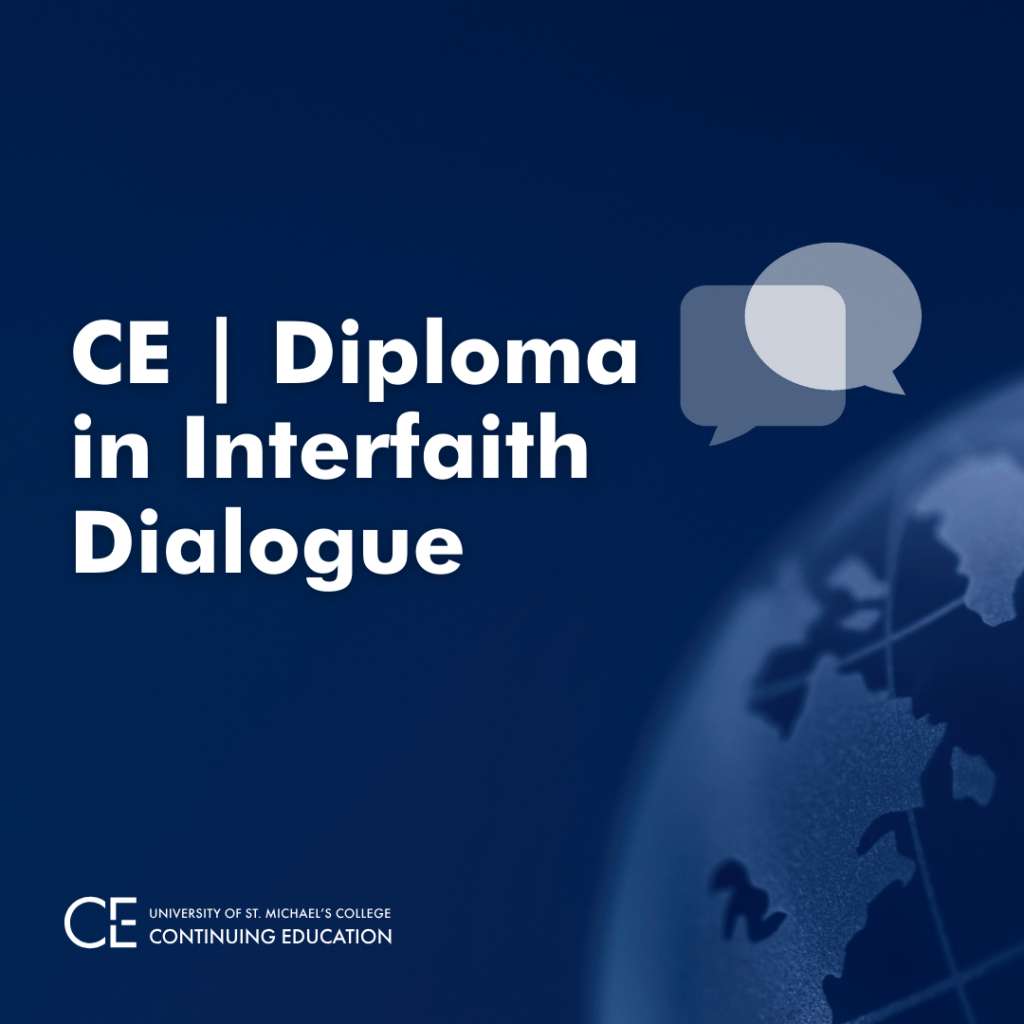Bridge Beliefs, Build Understanding
What could be possible if we understood each other better? The Diploma in Interfaith Dialogue will equip you to engage in meaningful, respectful interfaith conversations and situations by exploring diverse religious traditions, practices, spiritualities, and texts. Through experiential learning, dialogue techniques, and a capstone project, you will develop skills to foster understanding, connection, and peace across faith communities in your lived experience.

Diploma in Interfaith Dialogue Overview
The Diploma in Interfaith Dialogue focuses on building confidence and skills for effective communication and encounters across differences. The mandatory core course, Foundations of Interfaith Communication & Dialogue, will introduce you to the tools and techniques for open, curious, and non-judgemental communication—skills that will be central to every elective course.
Elective courses within the Diploma will be structured around the Four Levels of Interfaith Dialogue, ensuring that you experience diverse ways of encountering and appreciating different faith traditions:
Dialogue of Life – Courses in this category will explore how people of different faiths coexist in daily life, emphasizing relationships, shared experiences, and cultural interaction. You will reflect on personal experiences and examine case studies of interfaith communities.
Dialogue of Action (Deeds) – These courses will focus on current examples and opportunities for interfaith collaboration in areas such as social justice, environmental stewardship, and community service. You will examine real-world initiatives, both internationally and in Canada, where faith groups work together for the common good.
Dialogue of Religious Experience – You will engage with the spirituality and faith practices of different traditions, including meditation, prayer, rituals, and sacred objects and places. Courses may include site visits, guest speakers, or experiential activities to deepen appreciation for the commonalities, differences, and distinctive claims of various religions.
Dialogue of Theological Exchange – You will explore core beliefs, texts, doctrines, and worldviews of various religious traditions. You will learn to compare them respectfully and appreciate how religious convictions shape self-understanding, relationships with others, and our sense of meaning in the world.
Learners who wish to complete the Diploma must take at least one course from each of the four Levels.
In the capstone project, you will apply the principles of interfaith dialogue to a real-world issue of your choice. You will demonstrate your ability to foster mutual understanding, address societal challenges, and propose actionable solutions through research, reflection, and engagement with people of diverse faith perspectives and spiritualities.
Diploma Outcomes
By the end of the program, you will be able to:
- Demonstrate Interreligious Understanding – Analyze key beliefs, practices, and historical developments of major religious traditions, recognizing commonalities and differences.
- Engage in Meaningful and Pragmatic Interfaith Dialogue – Apply effective communication strategies to engage respectfully, with curiosity and without judgement, in discussions and encounter across religious traditions, fostering mutual understanding and collaboration.
- Critically Reflect on Personal and Social Impacts of Religion – Evaluate the role of religion in shaping individual identity, societal values, artistic expression, and global issues
- Apply Interfaith Perspectives to Social Action – Demonstrate an understanding of the value of promoting interfaith cooperation in areas such as social justice, community building, and environmental sustainability.
- Synthesize Theological and Experiential Learning – Integrate your lived experience with faith traditions and insights to form a personal, nuanced and applicable perspective on interfaith relations in your own milieu.
Curious to know what this learning looks like in action? Read the reflection of 2025 graduate Simon Burke here!
Admission Requirements
- The Diploma in Interfaith Dialogue is a non-degree credit program offered by the Division of Continuing Education. There are no academic or professional pre-requisites, and learners do not need to apply to be accepted to the program. Learners from all faith traditions are invited and encouraged to participate in this program.
- Learners who have completed the mandatory core required course (Foundations of Interfaith Communication and Dialogue*), and 8 elective courses (including at least one course from each Level of Interfaith Dialogue) will be permitted to enrol in the capstone course**. Upon successful completion of the capstone, learners are awarded the status of completing the Diploma in Interfaith Dialogue and will be invited to convocated in a ceremony in the Fall on campus at the University of St. Michael’s College in the University of Toronto.
*Note: Learners who completed SMD102 Dialogue Principles and Practices before Fall 2025 do not need to take SMCE3000
**Note: Learners who participated in the Diploma program before Fall 2025 may choose to complete the capstone course, or to complete the mandatory SMCE3000/SMD102 course and 9 elective courses
Fees
Each course within the program costs $150.
This program is supported by a significant financial endowment from Scarboro Foreign Missions (SFM), and extends the charism of the SFM Fathers in interfaith dialogue. SFM has been deeply committed to interfaith dialogue for many decades. This Diploma in Interfaith Dialogue situates the legacy of the Scarboro Foreign Mission to create an educational opportunity for all who wish to understand the religious ideals and values of their neighbours and even themselves within Continuing Education at USMC, where our mission, vision and values, and adult learning pedagogies will support it.
Program Requirements
To complete the Diploma in Interfaith Dialogue, learners must complete the following within a maximum timeframe of 3 years:
Total Instructional Hours – 120 hours
Complete a mandatory core course – Take SMCE3000 Foundations of Interfaith Communication & Dialogue* (12 hours) to gain foundational skills in interfaith dialogue. Note: It is recommended, but not required, that learners take this course first.
*Note: Learners who completed SMD102 Dialogue Principles and Practices before Fall 2025 do not need to take SMCE3000
Take 8 Elective Courses – Select from various topics across the four Levels of Interfaith Dialogue (Life, Deeds, Religious Experience, Theological Exchange), ensuring at least one course from each level (96 hours total).
Complete the Capstone Course* – Engage in a final project applying interfaith dialogue principles through research, creative work, or community engagement (12 hours).
*Note: Learners who participated in the Diploma program before Fall 2025 may choose to complete the capstone course, or to complete the mandatory SMCE3000/SMD102 course and 9 elective courses
Courses
To get started in the Diploma in Interfaith Dialogue, choose a course and enroll. We recommend starting with SMCE3000 Foundations of Interfaith Communitation & Dialogue.
Learners may choose to register for individual courses without committing to the full Diploma program.
Each academic year, courses will be offered across Levels of Dialogue to ensure that all learners can meet the program’s breadth requirements.
*Learners who enrolled in the Diploma prior to Fall 2025 are not required to complete the Capstone*
Course Schedule, Fall 2025 to Fall 2026
| TERM | Course Name | Level of Dialogue | Modality |
| Fall 2025 | SMCE3000 Foundations of Interfaith Communication & Dialogue | N/A (Core Course) | In-Person |
| Fall 2025 | SMCE3003 Faith & Food | Dialogue of Life | In-Person |
| Fall 2025 | SMCE3005 Introduction to Buddhism | Dialogue of Theological Exchange | Online |
| Fall 2025 | SMCE3013 Christianity and Judaism on Disabilities | Dialogue of Theological Exchange | Online |
| Winter 2026 | SMCE3000 Foundations of Interfaith Communication & Dialogue | N/A (Core Course) | Online |
| Winter 2026 | SMCE3015 Reading (and Misreading) the Bible and the Torah | Dialogue of Theological Exchange | Online |
| Winter 2026 | SMCE3007 “Called to be Peacemakers”: Peace, Conflict Resolution and Reconciliation | Dialogue of Deeds | Online |
| Winter 2026 | SMCE3008 Eco-Spiritualities | Dialogue of Life | Online |
| Spring-Summer 2026 | SMCE3014 Messianic Faiths | Dialogue of Theological Exchange | Online |
| Spring-Summer 2026 | SMCE3016 Sacred and Ritual Spaces | Dialogue of Theological Exchange | Online |
| Spring-Summer 2026 | SMCE3004 Introduction to Catholic Social Teaching | Dialogue of Deeds | |
| Fall 2026 | SMCE3000 Foundations of Interfaith Communication & Dialogue | N/A (Core Course) | In-Person |
| Fall 2026 | SMCE3003 Faith & Food | Dialogue of Life | In-Person |
| Fall 2026 | SMCE3011 Law & Religion | Dialogue of Theological Exchange | Online |
| Fall 2026 | SMCE3012 Accompaniment: Walking Together in Faith | Dialogue of Religious Experience | In-Person |
Please note: Programming is subject to change
Questions?
Land Acknowledgement
We wish to acknowledge this land on which the University of St. Michael’s College operates. For thousands of years it has been the traditional land of the Huron-Wendat, the Seneca, and the Mississaugas of the Credit. Today, this meeting place is still the home to many Indigenous people from across Turtle Island and we are grateful to have the opportunity to work on this land.


